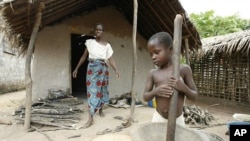The United Nations Children’s Fund is appealing for more than $20 million to provide life-saving assistance to tens of thousands of children and women affected by the post-election crisis in the Ivory Coast and five neighboring countries. The funds will support humanitarian operations in the region over the next three months.
The United Nations says the political and humanitarian crises unfolding in the Ivory Coast are expected to affect nearly 2,5 million people.
This includes some 450,000 internally displaced people in the Ivory Coast and another 150,000 people who are expected to move to five neighboring countries. Some 23,000 refugees have already fled to Liberia.
But, the United Nations warns thousands of other Ivorians are likely to seek asylum in neighboring Guinea, Mali, Burkina Faso and Ghana if the situation worsens and civil war erupts again in the Ivory Coast.
The UN Children’s Fund says clean water, shelter and food are the most pressing needs for internally displaced people, refugees and host community members. This is in addition to protection, health and education services.
UNICEF spokeswoman Marixie Mercado says the agency’s priority is to make sure children get access to clean drinking water, sanitation, adequate nutrition and health care.
"Our main concerns are the ability to respond to disease outbreaks through vaccination campaigns. There are currently measles, meningitis and yellow fever epidemics in the region right now," she said. "Access to clean drinking water and proper sanitation facilities, adequate nutrition for communities faced with food price hikes. And that hospitals, clinics and medical treatment are available and that children are protected and not involved in the disturbances."
Mercado says UNICEF is working with other agencies to provide education, household items, water and sanitation for those who have crossed the border into Liberia. She says it is prepared to do the same should people cross borders into other neighboring countries.
UNICEF estimates 40 percent of the affected population in the Ivory Coast will be in the North, a region already weakened by a decade of instability.
As in all conflict situations, children suffer the most. Latest data from a survey carried out last year in eight regions of the north and west indicate 12 percent of children suffer from acute malnutrition.
Another issue of great concern is protection. UNICEF says women and children are particularly vulnerable to sexual violence, prostitution, and labor exploitation in areas of conflict.
Should fighting break out in Ivory Coast, UNICEF warns many children are likely to be separated from their families and recruited as soldiers.




